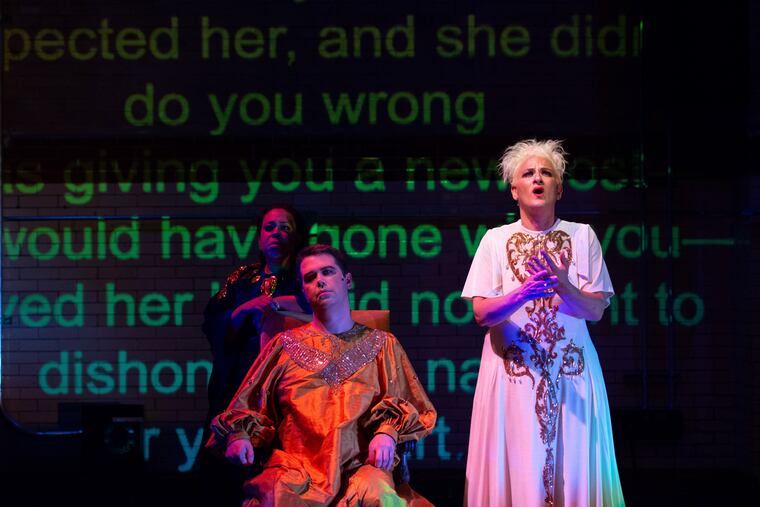90 wasted minutes: 019′s ‘Let Me Die’ collapses in a heap
The concept was cloudy, the philosophy behind it unrevealing, and performances, when not bordering on amateurish, had that telltale force field of pretension that’s actually just a smoke screen for lack of content.

Just because opera fans spend long spans of time in the theater doesn’t mean they readily tolerate having their time wasted — especially at Opera Philadelphia’s O19 Festival. Time spent at an unsuccessful event can mean time lost at a simultaneously scheduled one.
Jointly presented by Opera Philadelphia and the Philadelphia Fringe Festival at FringeArts, the Saturday premiere of Let Me Die, an extended medley of operatic death scenes by singer/writer Joseph Keckler, was indeed a wasted 90 minutes. The concept was cloudy, the philosophy behind it unrevealing, and performances, when not bordering on amateurish, had that telltale force field of pretension that’s actually just a smoke screen for lack of content.
As theater, Let Me Die was in a similar ballpark as John Cage’s 1987 Europeras I and II, an I Ching-guided operatic scramble with singers visually portraying a classic operatic character but vocally portraying another. With his distinctively imposing, operatically trained voice, slender silhouette and mop-top hair, Keckler sent up operatic histrionics with cheap shots — generic exaggeration — rather than with the wit and insight needed to make any operatic investigation, comic or not, something other than tiresome or redundant.
Attempting to be brainy and droll, he stood at a lectern and talked about the differences between fake death and real death (obvious), that sopranos have the most death scenes (more obvious) and that the death scenes are what everybody is waiting for (wrong — when an opera is working right, you dread the character’s demise).
Even the greatest death scenes depend on what builds up to them. Without that — and with only a violin/piano accompaniment — Let Me Die was like jumbled skeletons, from Purcell’s Dido and Aeneas to Strauss’ Elektra. At one point, Keckler attempted a Boris Godunov sing-along to no purpose or effect. He also wondered whether putting death scenes together might create a new operatic animal of some sorts. That didn’t happen. One of his own compositions, “Opera Pirate,” about working for someone who sells bootleg recordings, had little sense of what music can add to words.
Whatever he knows about opera — he mistakenly referred to the legendary baritone Leonard Warren as a tenor, and the Parsifal character Kundry as being from Wagner’s Ring Cycle — he certainly doesn’t love it: The overall manner was emotionally cool.
For the second section, Keckler put his lectern on the floor, making it into a coffin. There he laid for the rest of the piece while three singers wearing cheap, glitzy robes took over, singing a series of aria fragments grouped according to operatic tropes — couples, icons, witches and such. The singers — whom I won’t identify out of sympathy for their plight — mostly seemed lost. You couldn’t even sleep through this thing: It was amplified. The ending involved sort of an Angel of Death dancer and some antiphonal vocal effects — nice, but way too little, too late.
How does such a thing as Let Me Die arrive in a festival alongside such serious, innovative works as Denis & Katya? Well, the piece as performed in Philadelphia was still coming together in the weeks leading up to the Saturday premiere, so perhaps nobody really knew what they were getting. At least the Fringe Festival can shoulder half the blame.
Let Me Die
Performances through Sept. 28 at FringeArts, 140 N. Christopher Columbus Blvd., as part of the Fringe Festival and Opera Philadelphia’s Festival 019.
Tickets: $40 and $60
Information: 215-732-8400 or operaphila.org.